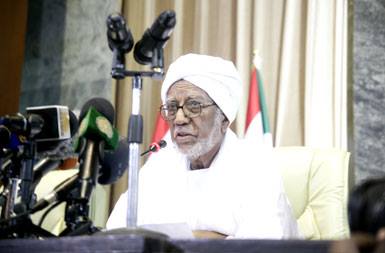Sudan’s new parliament speaker vows to push national dialogue efforts
June 1, 2015 (KHARTOUM) – The newly elected speaker of the Sudanese parliament Ibrahim Ahmed Omer said his country is committed to promoting the principles of Shura (consultation) in all issues that affect the nation’s progress towards prosperity and development.

He pointed that the national dialogue initiative launched by president Omer al-Bashir has been widely welcomed by those who are keen on Sudan’s progress, demanding adherence to unity and to raise the spirit of cooperation and brotherhood.
Bashir launched the national dialogue initiative in January 2014 but it faced serious setbacks after the government refusal to create suitable atmosphere by releasing political prisoners, ensuring freedoms, and postponing elections.
The Umma Party led by former PM al-Sadiq al-Mahdi withdrew from the process in protest of al-Mahdi’s arrest in May 2014.
Later on, several political parties including the Reform Now Movement (RNM) led by Ghazi Salah al-Din and the Just Peace Forum (JPF) led by al-Tayeb Mustafa and the Alliance of the Peoples’ Working Forces (APWF) announced they had decided to suspend participation in the national dialogue until the requirements of a conducive environment are met.
The speaker of the parliament stressed that the National Assembly intends to continue efforts to complete the national dialogue and to engage all political forces and civil society figures to resolve the challenges facing the country particularly issues of security and peace.
He noted that the recent parliamentary and presidential elections was a necessary constitutional requirement, describing it as “bright spot” in Sudan’s history.
Omer noted that 43 political parties have participated in the elections, saying that 21 of them are being represented in the parliament.
Sudan’s general elections produced sweeping victory for the ruling National Congress Party (NCP) and president Bashir was re-elected with 94% of the votes.
It should be recalled that the opposition boycotted the election, citing a widespread crackdown on civil society and the media, which they say created an impossible environment to fairly contest Bashir’s presidency.
Omer called upon the civil society leaders to be aware of the aggression plots which targets Sudan’s security and stability, praising efforts of the army and regular forces to maintain security and defend the country against various types of aggression.
He emphasized the parliament’s full support for the army and the police, pointing to Sudan’s participation in the Saudi-led “Decisive Storm” operation to restore the legitimate rule in Yemen.
He stressed that the Sudanese people are standing by their leadership in its efforts to support the Arab and Muslim nation.
Last April, Sudan joined the military coalition against Yemen’s Huthis comprising mainly of Arab Gulf states in addition to Egypt, Jordan and Morocco.
The offensive codenamed “Operation Decisive Storm” is targeting Shiite Houthi militants allied with Iran, who have taken control of Yemen’s capital Sanna since September 2014.
The head of the independent lawmakers bloc at the national assembly Abdul-Jalil Aajabin disclosed their intention to meet with president Omer Hassan al-Bashir to participate in the executive branch while finding guarantees for the bloc to work with the government in accordance with national principles.
Aajabin who was speaking at a press conference in the parliament noted that they come from marginalized areas in need of services.
His deputy Mubarak Abbas announced their agreement on fundamental principles for the nation’s issues and the development of the less-developed regions in coordination with the government for what he called the big goals.
“We will not act as opposition in all issues but we will work with a strong will to pass policies,” Abbas said.
MP Abu al-Gasim Burtum from Dongola constituency (2), who declined to join the independent bloc and refused to vote for any of the candidates for parliament speakership expressed surprise over the choice of Omer saying he expected the ruling party would put forward new faces.
He pointed out that he did not run for parliament to be a pressure tool but to provide services to his constituents and for the country and to covey the concerns of the citizens of his district.
(ST)
